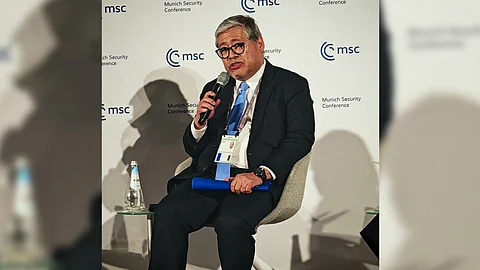
- NEWS
- the EDIT
- COMMENTARY
- BUSINESS
- LIFE
- SHOW
- ACTION
- GLOBAL GOALS
- SNAPS
- DYARYO TIRADA
- MORE

Foreign Affairs Secretary Enrique Manalo raised concerns about the growing presence of Chinese ships at Ayungin Shoal during a panel discussion at the Munich Security Conference on Sunday.
Responding to a question on why the Philippines has yet to fulfill its supposed promise to tow the BRP Sierra Madre from Ayungin Shoal, Manalo pointed to the presence of numerous Chinese ships in the area, despite the shoal being a significant distance from China.
“On the issue of Ayungin Shoal, we call it Ayungin Shoal in the Philippines [or] Second Thomas Shoal, there was never a promise to remove the ship,” he said.
“But what we should really take into account is why there is such a huge presence of Chinese Coast Guard vessels around Ayungin Shoal. I mean that’s the question,” he said.
China claims the vast South China Sea, including the West Philippine Sea. Recently, confrontations between the Philippine Coast Guard and China Coast Guard and militia vessels have significantly increased.
Beijing has been consistent in insisting on its territorial rights at Ayungin Shoal, demanding that the Philippines tow the Sierra Madre from the area.
The BRP Sierra Madre, a World War II ship, is a permanent station for the Philippines’ military personnel at Ayungin Shoal, also known as Second Thomas Shoal.
Manalo pointed out that Ayungin Shoal is only 70 nautical miles from the nearest Philippine territory, in stark contrast to the “hundreds of nautical miles” separating it from China’s Hainan province.
“Why are there so many Chinese Coast Guard ships there? Is it their territory? Anyway, if we follow the UNCLOS or the Arbitral Award, we are clearly within our rights to patrol that area,” he stressed, referring to the 2016 arbitral decision of the Permanent Court of Arbitration that favored Manila’s sovereign rights in the area.
Manalo also noted that the Philippines is “merely exercising” its rights to the area and does not intend to pose any threats to any nation that also claims the area.
Manalo also asserted that the 2016 Arbitral Award that rejected China’s historic “nine-dash line claim” over the South China Sea was “legally binding and part of the international law.”
“It is clear that the arbitral award of 2016 is legally binding and part of the international law, and our only hope is that one day China can abide by the arbitral ruling… to certainly ease tensions,” he said while looking at Fu Ying, former Vice Minister of Foreign Affairs of the People´s Republic of China, who was among the panelists.
China has been consistent in rejecting the arbitral ruling, calling it “illegal, null and void.”
Prior to this, Fu was asked about China’s apparent double standard when it came to adhering to rules-based orders while rejecting the arbitral ruling.
